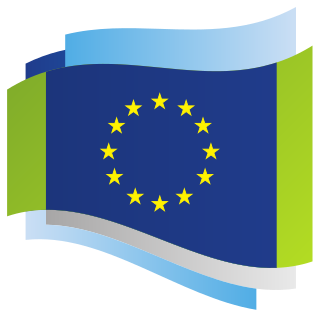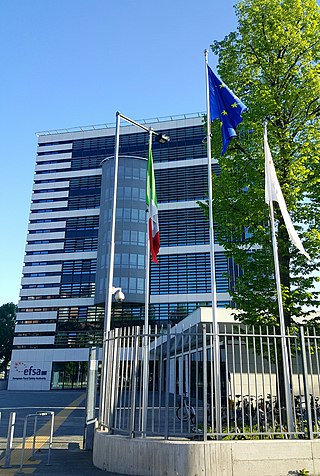
The European Environment Agency (EEA) is the agency of the European Union (EU) which provides independent information on the environment.

The European Union Intellectual Property Office, founded in 1994, is the European Union Agency responsible for the registration of the European Union trade mark (EUTM) and the registered Community design (RCD), two unitary intellectual property rights valid across the 27 Member States of the EU. Every year, it registers an average of 135 000 EU trade marks and close to 100 000 designs. The EUIPO is also responsible for maintaining an Orphan Works Registry. Registered works have certain permitted acts under the Orphan Works Directive.

The Official Journal of the European Union is the official gazette of record for the European Union (EU). It is published every working day in all of the official languages of the member states of the EU. Only legal acts published in the Official Journal are binding.
The European Agency for Safety and Health at Work (EU-OSHA) is a decentralised agency of the European Union with the task of collecting, analysing and disseminating relevant information that can serve the needs of people involved in safety and health at work. Set up in 1994 by Council Regulation (EC) No 2062/94 of 18 July 1994, EU-OSHA is based in Bilbao, Spain, where it has a staff of occupational safety and health, communication and administrative specialists. William Cockburn is the current Interim Executive Director of EU-OSHA. Council Regulation (EC) No 2062/94 was replaced by Regulation (EU) 2019/126 on the 20 February 2019.

The European Defence Agency (EDA) is an agency of the European Union (EU) that promotes and facilitates integration between member states within the EU's Common Security and Defence Policy (CSDP). The EDA is headed by the EU High Representative for Foreign Affairs and Security Policy, European Commission’s Vice President (HR/VP), and reports to the Council. The EDA was established on 12 July 2004 and is based in Brussels, Belgium, along with a number of other CSDP bodies.

The European Border and Coast Guard Agency, commonly known as Frontex, is an agency of the European Union headquartered in Warsaw, Poland, exercising in coordination with the border and coast guards of member states the border control of the European Schengen Area, a task within the area of freedom, security and justice domain.

The European Food Safety Authority (EFSA) is the agency of the European Union (EU) that provides independent scientific advice and communicates on existing and emerging risks associated with the food chain. EFSA was established in February 2002, is based in Parma, Italy, and for 2021 it has a budget of €118.6 million, and a total staff of 542.
CEPOL, or the European Union Agency for Law Enforcement Training, is an agency of the European Union dedicated to training law enforcement officials. The institution was founded in 2000 and adopted its current legal mandate on 1 July 2016. It is based in Budapest, Hungary.

The European Fisheries Control Agency (EFCA) is the agency of the European Union (EU) that co-ordinates the national operational activities in the area of fisheries, and assists the member states in their application of the Common Fisheries Policy (CFP). The agency is based in Vigo,, Spain.
The European Institute of Innovation and Technology (EIT) is an independent body of the European Union with juridical personality, established in 2008 intended to strengthen Europe's ability to innovate. The EIT’s three “core pillars” of activities are: entrepreneurial education programmes and courses across Europe that transform students into entrepreneurs; business creation and acceleration services that scale ideas and budding businesses; and innovation-driven research projects that turn ideas into products by connecting partners, investors, and expertise.

The European Personnel Selection Office (EPSO) is responsible for selecting staff to work for the institutions and agencies of the European Union including the European Parliament, the European Council, the Council of the European Union, the European Commission, the European Court of Justice, the Court of Auditors, the European External Action Service, the Economic and Social Committee, the Committee of the Regions and the European Ombudsman. Each institution is then able to recruit staff from among the pool of candidates selected by EPSO. On average, EPSO receives around 60,000-70,000 applications a year with around 1,500-2,000 candidates recruited by the European Union institutions.

The European Data Protection Supervisor (EDPS) is an independent supervisory authority whose primary objective is to monitor and ensure that European institutions and bodies respect the right to privacy and data protection when they process personal data and develop new policies.
Interactive Terminology for Europe (IATE) is the interinstitutional terminology database of the European Union. The project was launched in 1999 with the objective of creating a web-based interface for all EU terminology resources so as to make the information more easily available and ensure its standardisation throughout the EU institutions. It has been used in the EU institutions and agencies since summer 2004. A public user interface was released for testing in early 2007 and was officially opened on 28 June 2007. A new version was released on 7 November 2018 following a full rebuild of the system with state-of-the-art technologies, the latest software development standards, best practices on usability and accessibility, and a new look and feel.
The European Union Space Programme is an EU funding programme established in 2021 along with its managing agency, the European Union Agency for the Space Programme, in order to implement the pre-existing European Space Policy established on 22 May 2007 when a joint and concomitant meeting at the ministerial level of the Council of the European Union and the Council of the European Space Agency, known collectively as the European Space Council, adopted a Resolution on the European Space Policy. The policy had been jointly drafted by the European Commission and the Director General of the European Space Agency. This was the first common political framework for space activities established by the European Union (EU).
European Union (EU) concepts, acronyms, and jargon are a terminology set that has developed as a form of shorthand, to quickly express a (formal) EU process, an (informal) institutional working practice, or an EU body, function or decision, and which is commonly understood among EU officials or external people who regularly deal with EU institutions.
Latvian State Language Centre is a direct administration institution subordinated to the Minister of Justice of the Republic of Latvia. The purpose of the State Language Centre is to implement the national policy on the use of the official language. The Centre supervises and controls the conformity with laws and regulations on the use of official language, provides the State administration institutions and the public with official translations of laws and regulations and other documents issued by the State or international organisations while concurrently ensuring use of consistent terminology. The State Language Centre protects rights and interests of the official language users, promotes the regularisation of the cultural environment of language and promotes comprehensive functioning of Latvian language.

The Body of European Regulators for Electronic Communications (BEREC) is the body in which the regulators of the telecommunications markets in the European Union work together. Other participants are the representatives of the European Commission, as well as telecommunication regulators from the member states of the EEA and of states that are in the process of joining the EU.

The area of freedom, security and justice (AFSJ) of the European Union (EU) is a policy domain concerning home affairs and migration, justice as well as fundamental rights, developed to address the challenges posed to internal security by collateral effects of the free movement of people and goods in the absence of border controls or customs inspection throughout the Schengen Area, as well as to safeguard adherence to the common European values through ensuring that the fundamental rights of people are respected across the EU.
The Terminology Coordination Unit (TermCoord) is a supporting unit to the translation units of the Directorate-General for Translation of the European Parliament. TermCoord was created in 2008 by Rodolfo Maslias, professor at the Universities Luxembourg and Savoie-Mont Blanc, to stimulate and coordinate the terminology work of the 24 translation units of the European Parliament in Luxembourg.











